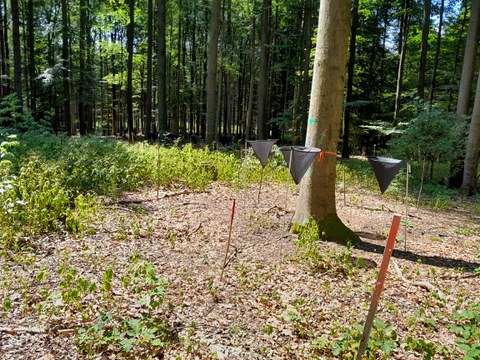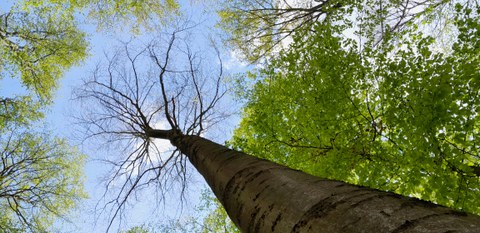Nov 20, 2025
Forests in transition: TUD research project is working to strengthen the resilience of European beech trees
The Eva Mayr-Stihl Foundation is funding a new joint project entitled “Forests in Transition: The Future of the European Beech during Drought Stress” at the Faculty of Environmental Sciences at TUD Dresden University of Technology from 2026 to 2029 with a total of EUR 1.6 million. Five forestry chairs and two chairs in geosciences will collaborate in this interdisciplinary research project.
Climate change with increasing droughts requires measures to strengthen the resilience of our forests. This also applies to the European beech, an important deciduous tree species in Germany. In particular, clear signs of damage can already be observed in older beech stands. Targeted thinning of stands — removing selected trees so that the remaining ones have to compete less for water— could be one way to improve the vitality of beech trees. However, there is currently little and partly contradictory information available on this.
This research project therefore aims to quantify the effects of different types of thinning on the water supply, as well as the vitality, biomass development, and carbon storage of old beech trees. This will provide the scientific foundation for developing silvicultural strategies to establish climate-resilient, mixed beech forests.
Prof. Karsten Kalbitz, who coordinates this joint project, highlights the novel combination of cross-scale monitoring approaches to obtain and link data on crown water status, water transport, soil water availability, and root activity in beech stands with varying degrees of thinning. Remote sensing approaches will allow researchers to predict transpiration, vitality, and carbon storage from the individual trees to the landscape level, supported by terrestrial measurements.
Existing experimental areas in the Dübener Heide (near-natural beech forest) and six other beech forests in Saxony (where thinning has taken place in a targeted manner) form the experimental basis for the project. Thus, the project will build specifically on ongoing research work by TUD's Forest Sciences in Tharandt. Close cooperation with the Saxony Forest State Enterprise (Staatsbetrieb Sachsen) and the Federal Forestry Agency (Bundesforst) will ensure the scientific success of the project while also guaranteeing its high practical relevance.
The project will work closely with the newly established junior research group “Forest-related Environmental Communication,” which is also funded by the Eva Mayr-Stihl Foundation, to combine scientific findings with target group-oriented public relations and practical communication in a pilot project.
“The focus on mature trees in various forests in the rejuvenated stand and the inclusion of all relevant data — from the roots to the crown — particularly impressed us in the research concept,” says Susann Pfeiffer from the Eva Mayr-Stihl Foundation. “In addition, the project will be able to use data from previous projects; the test areas have already been set up, and the scientists have successfully trialed their interdisciplinary collaboration. In other words, the starting conditions are ideal.”
Contact:
Prof. Karsten Kalbitz
Institute of Soil Science and Site Ecology
TUD Dresden University of Technology
Email:



